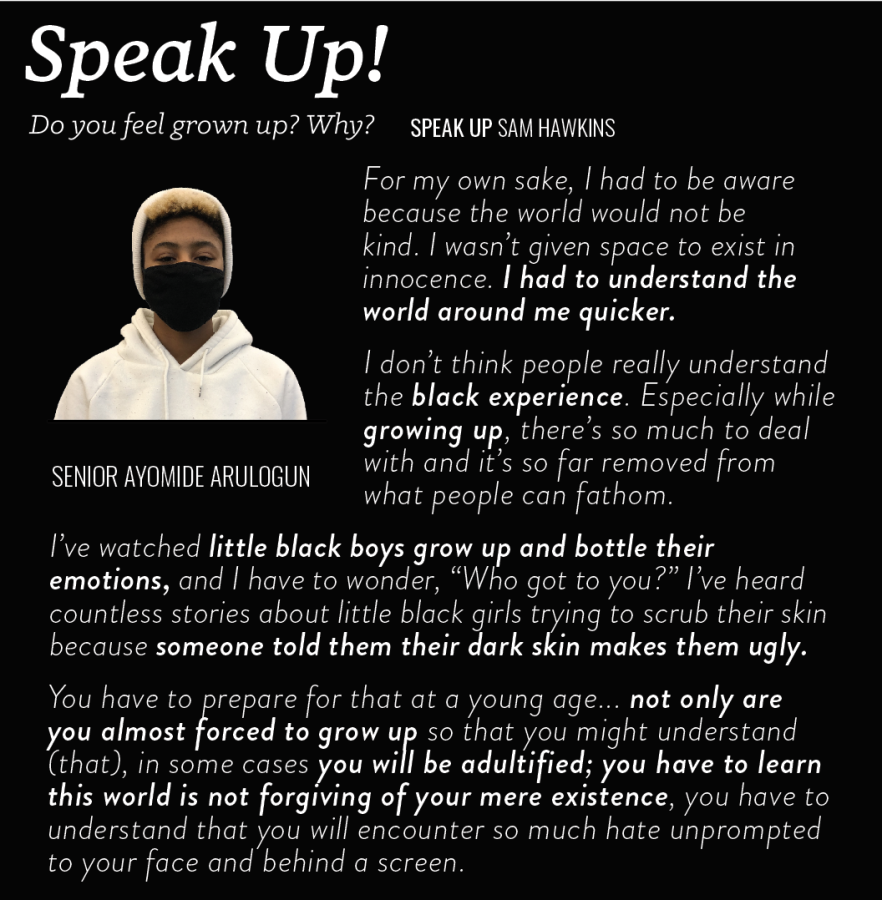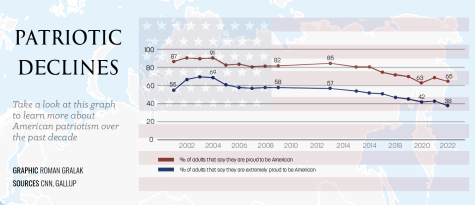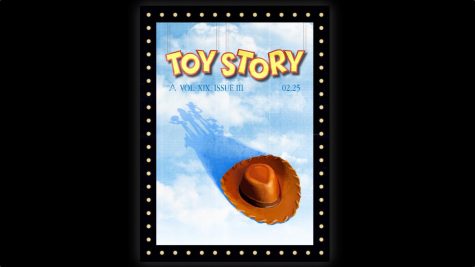All Grown Up
Students, teacher examine what it means to be “grown up”
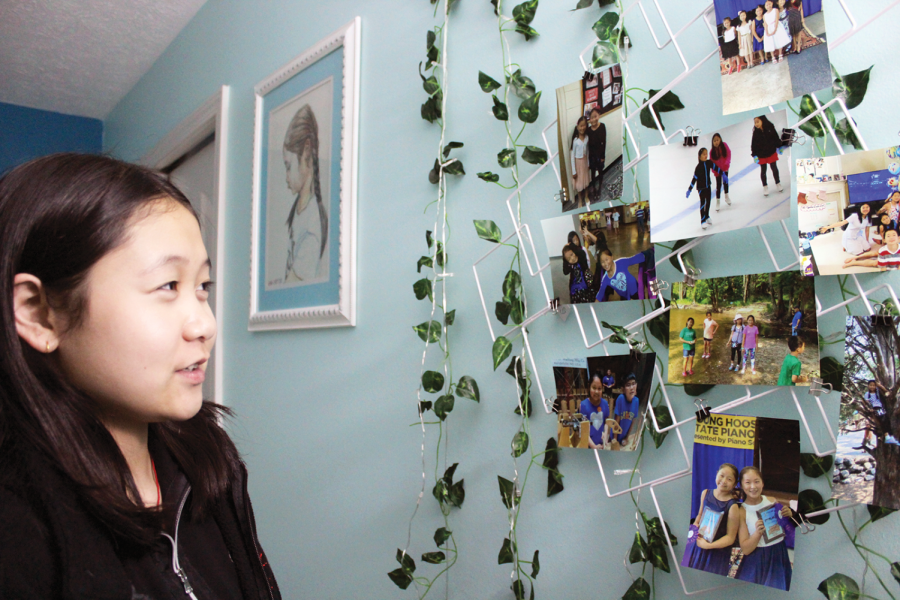
Senior Grace Rexroth has volunteered to work with kids through her church for multiple years now. In doing so, she said she has seen immense change in the kids she works with, both physically and socially.
“Seeing all of the different stories of different kids coming together through these nonprofit organizations and watching how these kids who’ve gone through so much can still just have fun (made me change my outlook on maturity),” Rexroth said.
Freshman Helena Wang said she thinks she has always been mature for her age, and lots of her changes and self-reflection were represented by her mental maturity.
“I think (being) mentally mature is really important because even if you’re physically mature, you also have to keep mental strength in yourself and make sure that you’re (mentally responsible) enough,” Wang said. “So (I think) it’s good to match your levels of maturity so they’re even.”
The American Psychological Association (APA) defines psychological maturity, or mental maturity, as “the ability to deal effectively and resiliently with experience and to perform satisfactorily in developmental tasks characteristic of one’s age level.” The APA recognizes the concept of maturity is not limited to physically growing up, but through one’s growth in their personal life as well.
Wang said she had a similar definition for the term as the APA.
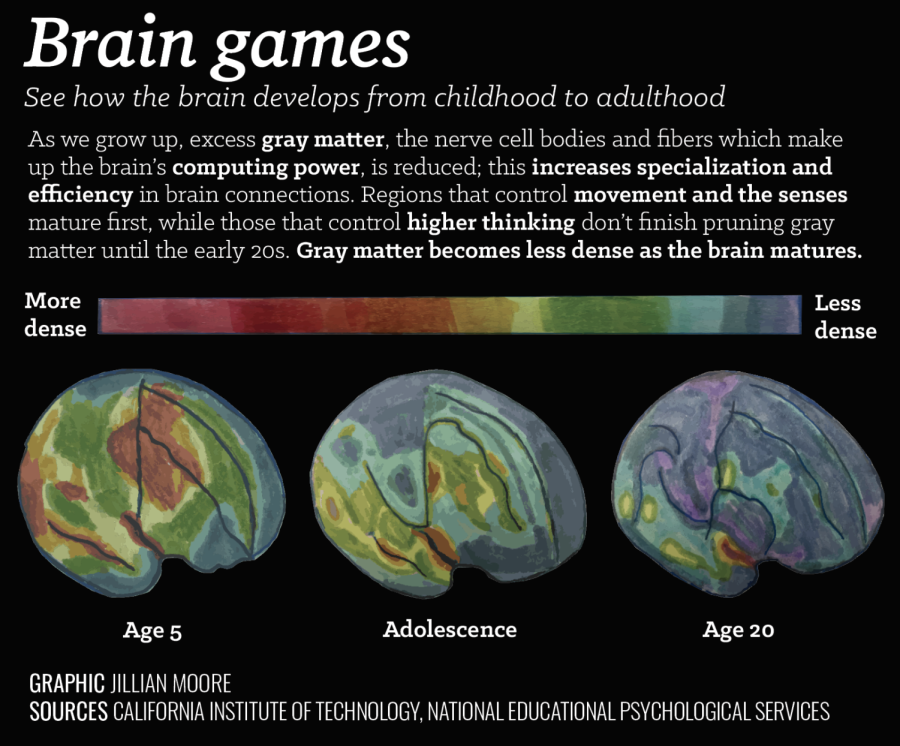
“(Mental maturity is) how much capability you hold in your life,” Wang said. “It’s not just physical capability, but it’s just overall how you hold it together and (deal with) stress and anxiety.”
Faith Dalton, a family and consumer sciences teacher who teaches both principles of early childhood education and early childhood education, said she teaches about the importance of physical tasks and psychological development in her early childhood education classes in order to provide a basis on how to assist the development of young children.
“All of this class’s (intention is to) talk about general development and what happens, but we also talk more (about the questions,) ‘how (can) we help with that process (of growing up)?’ And ‘How can we make that process better for the children?’” Dalton said. “And maybe, ‘How do we help those that may be struggling in certain forms of development?’”
In reflection of her experience teaching high school students, Dalton said she sees differences in how “grown up” her students act depending on their age and grade level.
“When I get the opportunity to have freshmen and to work with freshmen, I see more (difference in) social maturity,” Dalton said. “The way they interact with their peers is more loud and boisterous and I hear a lot more giggling and laughing and more comical relationships than what I see with my juniors and seniors, where it’s more, having the more serious conversations with their friends about what they are really struggling with. I feel like there is that sort of maturity (changing across different ages) in that aspect in terms of the relationships I see.” 
Rexroth said she used to be a quiet and introverted kid and never saw herself joining clubs or taking on leadership roles. This, however, has changed since she started high school, as she said she has taken part in multiple clubs and new hobbies, such as the Crochet Club. She said she has multiple standout memories about realizing her character growth, one of which happened at the beginning of this school year.
“(For) homecoming week, especially this year, my best friend (and I) dressed up every day. We went full out every single day and we always (went) to one of our math teachers, (Peter) Beck, and all of us were so dressed out and just having so much fun going up and down the halls getting all the free candy, visiting teachers and playing games,” she said. “I would have never worn a onesie to school (before this year). I loved it though, (and I had) so much fun.”
A common belief about personality changes is that the influence of large scale changes in one’s life or society are a primary factory in influencing one’s behavior. To that end, Wang said the change from middle school to high school has led her to feel more grown up and secure in herself.
“There’s definitely been a change (in how I have interacted with people), because I matured a little bit more. So my sense of humor and (how I) interact (with others) is a little different,” she said.
Rexroth said while she thinks maturing and growing up is important, there’s merit to allowing yourself to be immature from time to time.
“I wrote my whole college essay on how to be a kid again. And so I definitely do see, I don’t want to say a loss of innocence, but, like, a loss of innocence,” Rexroth said. “So when you get back to playing in the snow, you get to see the whole world from a whole different view and see just how fun things really are and (no longer are) focused completely on school and (recognize) one test doesn’t define who you are.”
Similarly, Dalton said the self-reflection does not stop after high school.
“I graduated high school six years ago and the growth has been, just, immensely crazy. I lived alone, went to college, moved out and did all of that, so I learned more about myself and the aspect of ‘how do I live? How do I provide for myself? How do I feed myself?’ I learned the basics, but I also learned more about what actually makes me happy. And (I do) what I need to do to make myself happy because there’s a lot of times in your adult life where you’re like, I feel kind of lost,” Dalton said. “It’s so easy to figure out what makes you, not anybody else, happy, so for the first time in your life, you’re kind of like, ‘Oh, I have to do this because I want to do it, not because there’s a grade hanging out there or because there’s this certain diploma that I’m going for, but because I want to it because it’s going to make me happy.’”
Rexroth said she believed while she’s going into college next year, the freedom coming alongside her future adult life means little in terms of her growth.
 “My freedom is going to be more limited next year because I’m going to have all the freedom I want. College is supposed to be a lot harder; we have to study more and do more work as well as living on your own, and there’s so many little things you wouldn’t think about. They add up,” she said. “I see my time right now as valuable and I spend as much time with (my friends) as I can. Going into next year in college, you don’t have any parents telling you, ‘No, you can’t do this.’ You don’t have teachers who are holding your hand through writing a paper. So one thing I feel like I’ll struggle with is because I’ll have no one telling me, ‘No, I can’t do this,’ so yeah, I’ll just go and do (whatever I want to).”
“My freedom is going to be more limited next year because I’m going to have all the freedom I want. College is supposed to be a lot harder; we have to study more and do more work as well as living on your own, and there’s so many little things you wouldn’t think about. They add up,” she said. “I see my time right now as valuable and I spend as much time with (my friends) as I can. Going into next year in college, you don’t have any parents telling you, ‘No, you can’t do this.’ You don’t have teachers who are holding your hand through writing a paper. So one thing I feel like I’ll struggle with is because I’ll have no one telling me, ‘No, I can’t do this,’ so yeah, I’ll just go and do (whatever I want to).”
Because of the drawbacks to freedom explained by Rexroth, Dalton said she advises young people to become their own motivators and take the lead whenever possible.
She said, “Eventually, wherever you work, you’re going to have to be a leader of something, whether it’s a project, a classroom full of kids, whatever it is, even if it’s just yourself, even if you work at home remotely, you have to be your own leader and your own motivator. I think having the opportunity at a younger age (to take leadership responsibilities) is something that’s priceless. And I think successful students take advantage of that.”
Wang said one way she tries to make sure she’s successful is to set goals addressing whatever she finds important, but she said she does not pressure herself to complete them.
“I do have goals, but I think most people, when they set goals, don’t always accomplish them. And I’m kind of that person where I set these imaginary goals, but I get to a certain level, of almost accomplishing the goal, but I never really get to it,” she said. “Sometimes I cheat them, but they’re always those basic kinds of goals, like get A’s and make new friends and all that.”
Wang said she does, however, think personal growth is gradual and continuous. Even when she does not achieve her goals, she said she keeps working toward them subconsciously.
“I think I (take small steps to work toward goals) but I don’t think I do it physically. I’m like, ‘I’m going to do this to reach this goal,’ I kind of just do a mental list,” she said. “‘Okay, I kind of just did this, and I’m gonna do this now.’ So you’re not aware of it very often, but I’m pretty sure I do it.”
Rexroth said she agreed with this sentiment.
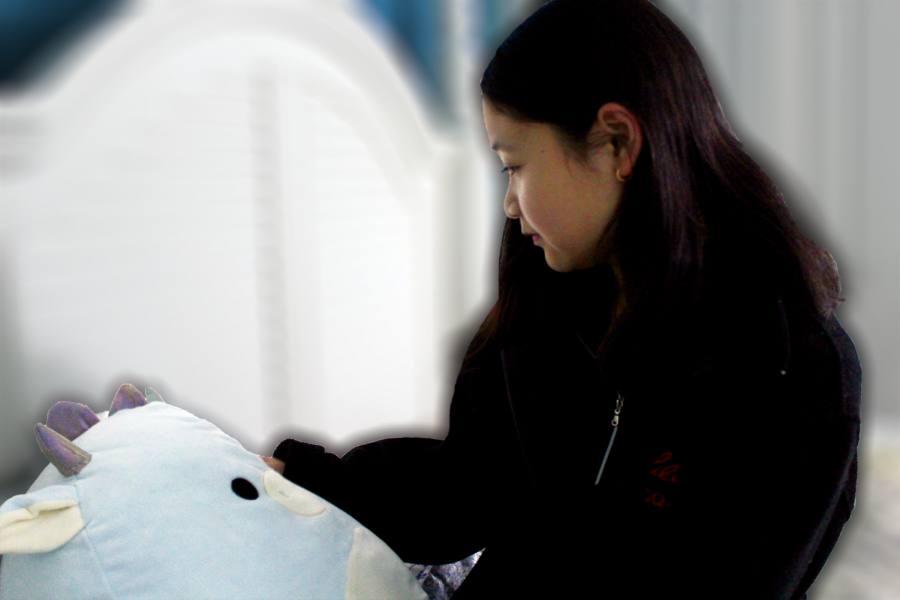
“I think a lot of change is subconscious just because subconsciously you learn (in situations) like having a conversation with someone. (You’ll think,) ‘Oh, they don’t like it when I do this. Huh? Well, let me try this.’ And it’s more of a trial-and-error kind of subconscious. If something doesn’t work out, I think, ‘Wow, if I do this, I get a bad result.’ So of course, I’m going to change (that behavior),” she said.
Rexroth said she does not think she can see her growth or change most of the time, but she always strives to be better.
“I’m never going to see the full person that I am because people in general, it’s human nature to be so self critical that I’m never going to see all of the good things that I can do because I’m always focused so much, like 100%,” she said. “But I always see the ‘Oh, I can still do this better, though.’”
Rexroth said while these are all signs of maturity, the idea of growing up is more complicated, and there is no hard line on when someone becomes “grown up,” or if they ever do at all. Wang, however, said the reflection and expectation of growth is a primary signal of growing up and the gradual progression of becoming the person you will ultimately be.
“An overall thing is that growing up, and all that stuff, it’s great,” Wang said “So it’s great to like, reflect on your past, past occasions or like experiences you’ve had, and then like to help improve your future like choices and decisions.”
